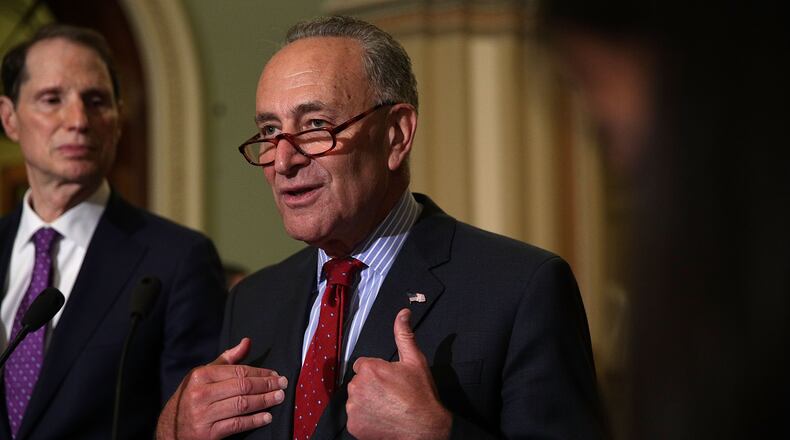The overriding dynamic in the current health-care debate in Washington is Democrats' unified refusal to go along with anything the GOP can at all claim is "repeal" of Obamacare. That's what is preventing even red-state Democrats from signing on to the various GOP plans, including (so far) the Graham-Cassidy bill .
Instead, Democrats say they want to "fix" Obamacare. What does that mean? Details are scarce, but here's what it doesn't mean: eliminating the individual mandate to buy health insurance.
I can say that with near-certainty. Why? Because the mandate is the element of Obamacare which most determines whether new proposals will get favorable or unfavorable scores from the Congressional Budget Office. The CBO assigns far more power to the individual mandate than current consumer behavior can possibly justify. More people have refused to comply with the mandate than gained insurance by purchasing plans on the individual market. Yet, CBO cites the elimination of the mandate as the cause of many of the individual-market coverage "losses" under GOP repeal plans. The fine print makes it clear these are mostly choices consumers would make , despite Democrats' brazenly false claims that all of these people would be "kicked off" their plans. Making matters worse, and as I've detailed before, the CBO also cites the mandate for future "losses" of coverage by people who so far have chosen not to purchase plans. In other words, we're talking about people "losing" something they currently do not have .
All of which brings me to the poor tax. Those who choose not to buy insurance are subject to a tax penalty. And who pays this penalty? Overwhelmingly, low- and middle-income Americans.
According to IRS data for 2015 , the most recent year available, 61 percent of tax filers reported less than $50,000 of adjusted gross income. Yet the same data set shows 79 percent of those who paid the Obamacare mandate penalty fell into that income category.
Going down the income ladder a bit, we see that 37 percent of penalty payers earned less than $25,000 per year. What's amazing about that is many of these people probably qualified for subsidies on the Obamacare exchanges. For example: A single, 21-year-old non-smoker making $25,000 per year would be eligible* for subsidies covering about half the cost of a "silver" plan, leaving a monthly bill of $144. That's not free, of course, but at less than 7 percent of income it's supposed to be the kind of "affordable" plan Obamacare set out to provide.
A two-person household earning $25,000 per year would have been eligible for a subsidized plan costing them just $93 per month. A three- or four-person household, just $43 per month. (The latter applies to those in Medicaid non-expansion states; in expansion states, they'd qualify for Medicaid. Even so, the percentage of households paying the penalty that earned less than $25,000 varied little from expansion states to non-expansion states, as this table for 2014 shows.)
Despite the subsidies, almost two in five households earning $25,000 or less chose not to buy insurance and to pay the penalty instead. Maybe they found it too expensive despite the subsidies. Maybe they decided it wouldn't cover their needs; silver-plan deductibles can be $2,000 per year for an individual and higher. Whatever their reasoning, they preferred to pay a tax penalty instead. (This also throws cold water on the idea the mandate will eventually push more people to buy insurance.)
So on the one hand, Democrats insist on keeping that tax on lower-income households in place. After they railed against GOP plans that would lead to estimated coverage "losses" due to CBO assumptions, it would be the height of hypocrisy for them to turn around and support a plan that would eliminate or even ease the individual mandate and produce the same result. Theirs is the only party in favor of this tax.
At the same time, the single-payer model they increasingly support as an alternative would lead to an even larger tax increase on these and other Americans. For starters, there's Sen. Bernie Sanders' proposal for a new 7.5 percent payroll tax to help finance his single-payer plan (and by "help finance," I mean all his tax plans combined pay for only half of it). On an annual income of $25,000 per year, that's $1,875 -- more than the subsidized "silver" insurance plan so many of these households chose not to buy. And that's just the first tax hike.
The GOP has found the going tough when it comes to repealing Obamacare. But the promises and assumptions Democrats are making while fighting Republicans' efforts are increasingly painting them into a corner from which they'll have a hard time escaping.
---
*Because the IRS data is for 2015 and the subsidy calculator at the link is for 2017 dollars, you have to choose the "% of Poverty" option on the calculator and enter the amount for $25,000 based on the 2015 federal poverty guidelines found here . The differences are small (a couple of dollars per month in most cases) but there will be differences if you don't make those adjustments.
About the Author
The Latest
Featured



